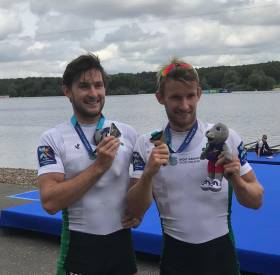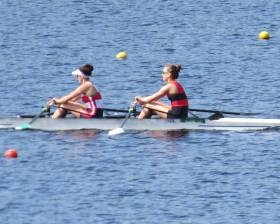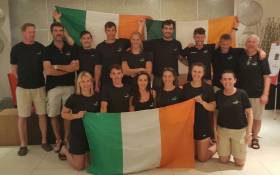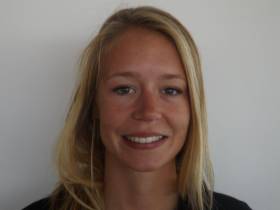Displaying items by tag: Ireland Team
Home International Team Chosen From Twenty-Five Clubs
#Rowing: Ireland will be represented by a team from 25 clubs at the Home International Regatta on Saturday, July 27th, at Strathclyde Park in Glasgow. The junior women’s team includes Holly Davis (14), the new junior single sculls champion of Ireland.
Home International Team (July 27th, Strathclyde, Glasgow)
Men, Senior
Sweep
J McAnallen, T O’Reilly, Pres, Cork; W Ronayne, S O’Neill, Shandon; A Kelly, J Ronaldson, UCD; S Bolger, E Jarvis, UCD; R Heaney, C Conway, NUIG; S O’Brien, F Dolphin, Waterford (Lwt); Cox: J Russell, NUIG.
Sculling
D Breen, UCC; A Christie, Bann; C Mulready, Castleconnell; H Moore, Queen’s; C Scanlon, UCD; L Sutton, New Ross.
Women, Senior
Sweep
S O’Donnell, C O’Brien, NUIG, Univ of Limerick; K Shirlow, L Murphy, Bann, NUIG; L Colclough, L McCarthy, Commercial; M Sullivan, Z Hyde, Killorglin; A Mooney, S Mannion, NUIG; Cox: C O’Connell, UCC.
Sculling
G O’Brien, Kenmare; E Buckely, UCC; E Crowley, Kenmare; J Legreasley, Shandon, Lwt; K Egan, Carlow, Lwt; E Brogan, Queen’s, Lwt; K O’Brien, UCD, Para.
Men, Junior
Sweep
A Murphy, Shandon; K O’Donovan, Shandon; T Hume, Col Iognaid; S Reidy, Col Iognaid; M Cronin, Cork; Paul Beechinor, Cork; C Feely, C’Connell; C Nolan, C’connell; R O’Gorman, St Michael’s; D Hartney, St Michael’s; cox: P Tannian, Col Iognaid.
Sculling
C Brennan, R Brennan, Neptune; B Kennell-Webb, New Ross; T McKnight, A Keogh, Three Castles; D Kelly, Lee; T Orlic, Neptune.
Women, Junior
Sweep
E Carney Frazier, E Forde, Col Iognaid; J Harrington, J Forde, Shandon; E Loftus, K Vandlik, Commercial; M O’Byrne, E Murphy, St Michael’s; E Zakarauskaite, M Quinn, Galway; Cox: CR O’Gorman, St Michael’s.
Sculling
H Davis, Lee Valley; H Gahan, Cork; L Crowley, Fermoy; A Moloney, Commercial; E Benson, St Michael’s; P Mullin, Belfast; M Kidney, Lee.
Ireland Name Big Team for World Rowing Championships
#Rowing: Seven Ireland crews have been chosen for the World Rowing Championships in Plovdiv, Bulgaria, from September 9th to 16th. There are four women’s crews, headed by Sanita Puspure in a single scull. Aifric Keogh and Emily Hegarty will compete in a pair and Monika Dukarska and Aileen Crowley in a double. The lightweight double of Aoife Casey and Denise Walsh, which competed at the European Championships, go forward.
European silver medallists Paul and Gary O’Donovan will compete in Bulgaria, while there is a heavyweight double of Ronan Byrne and Philip Doyle, which will be competing together at this level for the first time. The heavyweight pair of Mark O’Donovan and Shane O’Driscoll which finished 11th at the European Championships will compete in Plovdiv.
Another crew may be added to the team this week.
Ireland Team for World Rowing Championships, Plovdiv, Bulgaria, September 9th to 16th:
Men
Pair: M O’Donovan, S O’Driscoll
Double Sculls: Ronan Byrne, Philip Doyle
Lightweight Double Sculls: Gary O’Donovan, Paul O’Donovan
Women
Pair: Aifric Keogh, Emily Hegarty
Double Sculls: Monika Dukarska, Aileen Crowley
Lightweight Double Sculls: Aoife Casey, Denise Walsh
Single Sculls: Sanita Puspure
Other crews may be added
Ireland Rowing Team Chosen
#Rowing: The team which will represent Ireland at the World Cup in Belgrade (June 1st to 3rd) has been chosen. The selection was made after trials at the National Rowing Centre in Cork last weekend.
Belgrade is the first in a series of three World Cup regattas which culminate in the final World Cup in Lucerne from July 13th to 15th. This year, Rowing Ireland plans to send athletes to Belgrade and Lucerne.
In addition to the senior team competing in Belgrade, a training squad of athletes to be based at the National Rowing Centre in Cork has been announced.
Six rowers have also been selected to train for the Junior World Championships.
Ireland Team for World Cup Regatta, Belgrade, June 1st to 3rd:
Men
Pair: Mark O’Donovan, Shane O’Driscoll
Lightweight Double Sculls: Gary O’Donovan, Paul O’Donovan
Women
Pair: Emily Hegarty, Aifric Keogh
Double Sculls: Monika Dukarska, Aileen Crowley
Lightweight Double Sculls: Denise Walsh, Margaret Cremen
Single Scull – Sanita Puspure
Training Group to be based at National Rowing Centre:
Heavyweight Men: Andy Harrington, Patrick Boomer, Philip Doyle, Ronan Byrne.
Heavyweight Women: Tara Hanlon, Natalie Long.
Pre-Selected Rowers who will train for the Junior World Championships:
Men’s Quadruple: Jack Keating, Jack Dorney, Alex Byrne, Luke Nally-Hayes.
Women’s Double Scull: Ciara Moynihan and Ciara Browne.
Ireland Team the Afloat Rowers of the Month for September
#Rowing: The Ireland team which brought the country glory at the World Rowing Championships in Florida are the Afloat Rowers of the Month for September. In that month, Ireland took two gold medals through Mark O’Donovan and Shane O’Driscoll in the lightweight pair and Paul O’Donovan in the lightweight single sculls.
The pair crowned the perfect season with their victory. They won gold at the three World Cup regattas and the European Championships. The pressure was on in World Championship final, with both Brazil and Italy rowing well on the day. But O’Donovan and O’Driscoll were peerless. They set a very high stroke rate, took the lead – and saw off their challengers.
Paul O’Donovan retained the title he had taken with such an extraordinary set of performances in Rotterdam in 2016, just weeks after he had taken a silver at the Olympic Games in a lightweight double with his brother Gary. This time, Gary had to drop out of the lightweight double, as illness had restricted his training (he supported the team as a reserve). Paul was back in the lightweight single in a boat which was new to him. He won all four races (heat, quarter-final, semi-final and final), seeing off a new set of challengers in the lightweight single, including Matthew Dunham of New Zealand, who took silver, and Kris Brun of Norway (bronze).
The rest of the Ireland team also gave the suppporters plenty to shout about. Sanita Puspure went on to take fourth in the single sculls and Denise Walsh reached the A Final of the lightweight single sculls, where she finished sixth. Two new heavyweight pairs gained experience of the top level as the team targets Tokyo 2020. Aileen Crowley and Aifric Keogh finished eighth and there was a 16th place for Patrick Boomer and Fionnán McQuillan-Tolan.
Well done to all the members of the Ireland team, the Afloat Rowers of the Month for September.
Rower of the Month awards: The judging panel is made up of Liam Gorman, rowing correspondent of The Irish Times, and David O'Brien, editor of Afloat magazine. Monthly awards for achievements during the year will appear on afloat.ie. Keep a monthly eye on progress and watch our 2017 champions list grow.
Ireland Send Seven Crews to First World Cup Regatta
#Rowing: The Ireland team for the first World Cup regatta, in Varese in Italy from April 15th to 17th, will feature seven crews. The Olympic-bound lightweight double sculls of Sinéad Jennings and Claire Lambe and Paul O’Donovan and Gary O’Donovan will be joined by the three boats which hope to find their way to Rio through the qualifiers in May – the lightweight men’s four, the women’s pair and single sculler Sanita Puspure – and by Siobhán McCrohan and Denise Walsh in lightweight single sculls. McCrohan and Walsh were to trial for a single spot, but the trial was twice postponed and both will now travel.
Pararower Karol Doherty will go out with the bulk of the team on April 12th, and will compete in the Paralympic Qualifier in Gavirate in Italy on April 20th to 23rd.
Ireland Team for World Cup, Varese, Italy, April 15th to 17th
Men
Lightweight Four: L Seaman, M O’Donovan, L Keane, S O’Driscoll. Lightweight Double Scull: P O’Donovan, G O’Donovan.
Women
Pair: L Kennedy, B O’Brien. Lightweight Double Scull: C Lambe, S Jennings. Single Scull: S Puspure. Lightweight Single Scull: S McCrohan, D Walsh.
Crew for Paralympic Qualification Regatta, Gavirate, Italy, April 20th-23rd: K Doherty (Arms and Shoulders men’s single scull).

































































